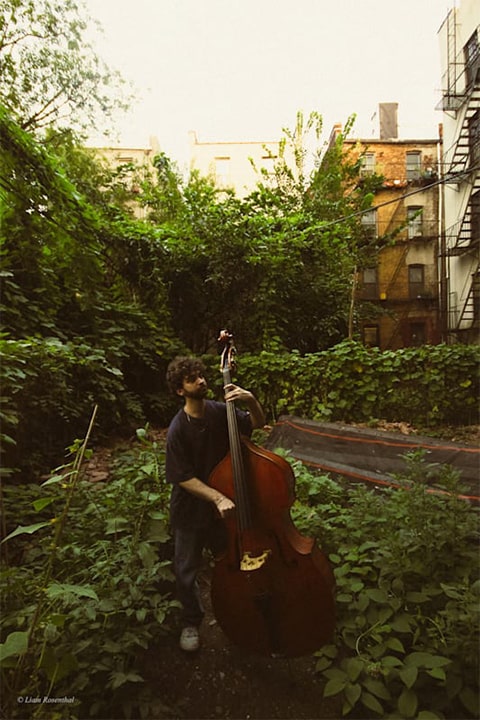Yoni Ben Ari is an accomplished bassist and composer, recognized as one of the most dynamic and in-demand voices in the contemporary music scene. With a distinctive sound rooted in deep groove, melodic sensitivity, and rhythmic sophistication, Yoni has carved out a reputation for both his virtuosity and his versatility.

As a bandleader, Yoni has brought his original music to prestigious stages, leading ensembles at renowned events such as the Eilat Red Sea Jazz Festival, the Medford Jazz Festival, and the Kfar Yona Jazz Festival. His performances reflect a deep commitment to musical storytelling and innovation, often blurring the lines between genres with authenticity and creative force.
In addition to his work as a leader, Yoni has performed at major music festivals such as Sound on Sound and Faster Horses, sharing the stage with pop and soul artist Charley. His current project, the genre-blending trio Swims, features guitarist Ely Perlman and drummer Shai Yuval. The group has been gaining increasing recognition in the indie and jazz scenes, with the release of three well-received singles showcasing their bold and textural sound.
Throughout his career, Yoni has collaborated with some of the most respected names in contemporary music, including Elena Pinderhughes, Roni Kaspi, Jason Palmer, Alain Mallet, Jamey Haddad, Kevin Harris, and many more. His ability to seamlessly adapt across styles while maintaining a strong personal voice has made him a highly sought-after performer and composer.
Yoni Ben Ari continues to push artistic boundaries, contribute meaningfully to the global music community, and inspire audiences and fellow musicians alike with every performance.
1. You’ve built a reputation as one of the most innovative bass players in the contemporary music scene. How did your relationship with the bass begin, and what drew you to it as your primary instrument?
I started out on electric bass, but pretty early on, I realized that if I wanted to work and really be part of a wide range of musical situations, I needed to play upright bass too. So I picked it up while I was in school—not out of some romantic idea, but because I saw it as a practical move. That decision turned out to be one of the most important in my career. The upright bass opened up a whole new world of sound and expression for me. Over time, it became much more than just a way to get gigs—it became a voice of its own in my playing and composing.
2. Your compositions have a distinct voice—blending groove, harmony, and texture in unexpected ways. How do you approach composing music? Do you start from the bass, a melody, or something else entirely?
It changes all the time. Sometimes it’s a rhythmic idea, sometimes a harmony, or even a sound I hear while walking down the street. I try not to box myself into one method. That said, the bass often plays a central role—not necessarily in the traditional sense, but as a storyteller. I use it to explore space and motion. I’m interested in tension, silence, and how to make the listener lean in. Composition, to me, is a process of revealing rather than constructing.
3. You’ve collaborated with a wide range of artists across genres. What do you look for in a musical collaboration, and how do you adapt your playing to different creative environments?
I look for curiosity and openness. I gravitate toward artists who are willing to experiment and who value deep listening over ego. Every collaboration teaches me something new—not just musically, but personally. Adapting comes naturally when I focus on serving the music instead of showcasing technique. I ask myself: what does this piece need? Sometimes that means playing less, sometimes it means stepping out of my comfort zone. It’s about trust and dialogue.
4. The role of the bass has evolved significantly in modern music. How do you view the instrument’s role today, and how do you push its boundaries in your own work?
I love that the bass is no longer confined to a supportive role. It can be melodic, percussive, abstract—it can lead. I’m drawn to the idea of the bass as a shape-shifter. In my own work, I often use effects, extended techniques, or unconventional tunings to explore new textures. I also think about negative space and how the absence of bass can be as powerful as its presence. It’s about expanding the vocabulary while still honoring the roots of the instrument.
5. Tell us about a project—past or upcoming—that you feel especially connected to. What makes it stand out to you?
There’s a solo project I’ve been working on that’s very personal—just bass, loops, and some field recordings. It’s more introspective than anything I’ve done before, almost like sound journaling. I’m exploring memory, place, and the idea of time as something elastic. What makes it special for me is that it doesn’t try to impress anyone. It’s raw and honest, and in many ways, it feels like coming home.
6. What advice would you give to young musicians who want to find their own voice, both as instrumentalists and as composers?
Don’t rush it. Your voice is something you uncover over time by being honest with yourself, staying curious, and making a lot of mistakes. Listen widely—across genres, cultures, disciplines. But also learn when to tune out the noise and just play. Trust your instincts, even if they go against the grain. And most importantly: stay vulnerable. That’s where the real art lives.






